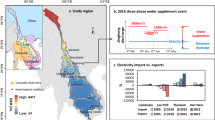Abstract
This paper addresses the important issue of transboundary sharing of fresh surface water resources, including quantity and quality dimensions. It carves a simple economic model of the benefits which can be generated by maximizing the joint profits earned, when the resource is shared efficiently between two countries. The appropriate policy instrument towards this end is a bilateral agreement to charge the same water price to all water users in a given sector. Market clearance will then follow to determine the optimal water price. The case of the Nestos river flowing through Bulgaria and Greece, but overexploited by Bulgaria, in the Balkans is used as a case study. The empirical estimation of a fixed proportions production function for corn derives a marginal water value of the Nestos water for Greece. This value, which applies under the current non-cooperative solution, is higher than the optimal water price in the cooperative solution.
Similar content being viewed by others
References
Alaouze (1991), ‘The Optimality of Capacity Sharing in Stochastic Dynamic Programming Problems of Shared Reservoir Operation’, Water Resources Bulletin 27(3), 381–386.
Arrow, K. and F. Hahn (1971), General Competitive Analysis, Holden-Day, San Francisco, CA.
Behar, N. (1992), ‘Fresh Water Resources from Inland Balkans: International Conflicts and Regional Cooperation’, Paper presented at the European Science Foundation workshop, Rethimno, Crete, July.
Dinar, A. and A. Wolf (1994), ‘International Markets for Water and the Potential for Regional Cooperation: Economic and Political Perspectives in the Western Middle East’, Economic Development and Cultural Change 43(1), 43–66.
Dudley, J. N. and W. F. Musgrave (1988), ‘Capacity Sharing of Water Reservoirs’, Water Resources Research 24(5), 469–658.
Efthimoglou (1988), ‘The Thissavros Hydroelectric Project’, Public Power Corporation, Athens (in Greek).
Gisser, M. and R. N. Johnson (1983), ‘Institutional Restrictions on the Transfer of Water Rights and the Survival of an Agency’, in T. L. Anderson, ed., Water Rights: Scarce Resource Allocation, Bureaucracy, and the Environment, pp. 137–165. San Francisco: Pacific Institute for Public Policy Research.
GMA [Greek Ministry of Agriculture] (1987), ‘Economic Feasibility Study for Irrigating Rodopi, Xanthi, Karala, and Drama Valleys Using Water from Nestos’, Athens (in Greek).
Howitt, R. E., D. E. Mann and H. J. VauxJr. (1982), ‘The Economics of Water Allocation’, in E. A. Engelbert and A. F. Scheuring, eds., Competition for California Water: Alternative Solutions, pp. 136–162, Berkeley: University of California Press.
KEPE [Center of Planning and Economic Research] (1989a), Water Resources, Athens (in Greek).
KEPE (1989b), ‘A Special Program for the Region of East Macedonia and Thrace’, Athens (in Greek).
Livingston, M. L. and H. von Witzke (1990), ‘Institutional Choice in Transboundary Pollution’, Society and Natural Resources 3, 159–171.
OECD (1983), Review of Environmental Policies in Greece, Paris.
Whelan,S. (1991), ‘Property Rights, Pareto Efficiency and Water Sharing Arrangements for the River Murray’, The University of New South Wales, School of Economics, Discussion Paper 91/15.
Zeitouni, N., N. Becker, M. Shechter, and E. Luk-Zilberman (1992), ‘Trading Water Rights in an International Context: The Mediterranean Arena’, Paper presented at the European Science Foundation workshop, Rethimno, Crete, July.
Author information
Authors and Affiliations
Rights and permissions
About this article
Cite this article
Giannias, D.A., Lekakis, J.N. Fresh surface water resource allocation between Bulgaria and Greece. Environmental and Resource Economics 8, 473–483 (1996). https://doi.org/10.1007/BF00357415
Accepted:
Issue Date:
DOI: https://doi.org/10.1007/BF00357415



